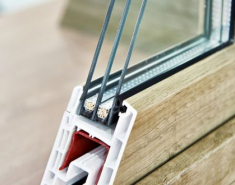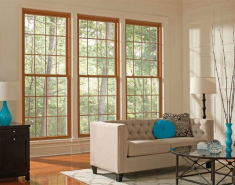Blair Windows & Doors: A Customer-First Approach to Premium Windows and Doors
It’s one of the burdens of home ownership. You answer the phone or door to find a sales rep on the other side, trying to hard sell you on something for your house. Window replacement companies are notorious for following a sales model similar to aluminum siding sales from the 1970s—annoying unsolicited phone calls, obnoxious robo calls and unrelenting door-to-door salespeople interested only in offering you a boilerplate solution that may or may not be what you actually need, if you even need it.
Blair Windows & Doors of Indianapolis, family owned since 1955, is not that kind of company. They are the very definition of customer first service.
We spent some time with owner Jim Meyer, operations manager Chris Cline and office manager Jennifer Penwell, talking about Blair’s window and door offerings to the central Indiana market and how they choose to operate differently than other window companies.
A Family Business
Blair Window was founded by Gene Blair in 1955 and originally worked only with building professionals in new construction. Jim Meyer came to work for Blair Window in 1973, after two years of service in the United States Army. Meyer started as a truck driver, advanced to the service manager and then moved into sales. In 1988, Blair retired and sold the company to his trusted and experienced longtime employee Jim Meyer and his wife, keeping the company very much in the family that had made it so successful.
Meyer expanded the business to include replacement windows and doors in addition to the new construction and changed the name to Blair Windows & Doors, Inc. He also added to the family business. Jennifer, the office manager, is his daughter.
One of the things Gene Blair did that made Blair Window successful—and unique—was he made it a point to not only supply products but also to service the products he sold. He didn’t rely on the manufacturers of his windows to send their service people; instead, he sent his own service people, who knew the job and the product inside and out. “And we continue doing that today,” said Meyer.
Unlike many companies in the construction business who do it all—lumber, flooring, drywall, siding—Blair Windows & Doors specializes in windows and doors, and that’s all they do. “We represent over 10 different companies so that we can find a product that will fit your particular need, not a one-size-solves-everything product,” noted Meyer, “and we supplement by being able to service everything that we sell.”
Meyer differentiates his company from others in the market by saying they are a “true window company, not a sales company that happens to sell windows.”
An Emphasis on Respecting the Customer
Blair Windows & Doors doesn’t sell by buying leads or canvassing neighborhoods. You won’t receive a telemarketing call from them or a have a salesperson show up unexpectedly at your door. Meyer and his team believe that the “people we work with are human beings. They should be treated respectfully.”
That respect is shown in how they approach the estimating process. Many companies will try a high-pressure approach to close the deal with you that day. Blair Windows & Doors, instead, has a conversation with you. They visit with you to get all the information they need on what you want to do, whether that’s window replacement or door replacement. Then they do a detailed quote and email that to you. “Our job,” said Meyer, “is to inform people about what we have, and if they are informed properly, they will make the right decision on what to do.”
Respect is also shown to customers by how Blair handles problems they encounter during the estimating process. For example, said Meyer, “If we come to your house and you have a fogged piece of glass, we’re going to tell you that you need to call a glass company. We’re not going to tell you, oh, you need to replace the whole window. We don’t play that game. We take the personal approach.”
Some people have contacted Blair Windows & Doors for a “second opinion,” as Cline puts it. They receive an estimate and aren’t comfortable with the numbers or they’re comparison shopping, so they ask Blair to give them their estimate. “When we do that, we don’t ask what number you are at,” stated Cline. “We just go and look at it and tell you where we’re at if we would do this job.”
Full-Installation and Full-Service Windows and Doors
Meyer and his team have over 60 years of experience in installing new windows and doors, and they offer full installation and full service on all their products.
In addition to new construction, Blair Windows & Doors works with remodelers and homeowners on replacement windows, including vinyl windows and wood windows, and door replacement for patio doors, sliding-glass doors, entry doors and double entry doors, steel entry doors, fiberglass entry doors and high-end wood entry doors. Meyer added, “We try to cover from the smaller houses all the way up into the very high-end custom homes.”
While other companies sell different grades of windows, Blair Windows & Doors uses a single chassis that can be made into different types of windows by what you add onto it, such as grills, screens and custom sizing. Instead of “good, better, best,” Meyer explained, “we have good products—we’ve used some of them for 30 years—that we continue to use because they work well and perform well out in the field.” Blair Windows uses several window brands, including Lincoln Windows, a higher-end wood window, Soft-Lite vinyl replacement windows, and Quaker, a higher-end wood window and vinyl window used in new construction.
For doors, Blair Windows & Doors uses Therma-Tru doors, GlassCraft doors and Good’s Millwork custom wood doors.
Meyer noted that in addition to residential work and light commercial work in new construction, they do work for historic buildings and older homes. “We don’t specialize in commercial [or historical buildings], but there are projects that our products work well on,” including commercial replacement and a lot of work in downtown Indianapolis for windows needing what Meyer’s calls “historic fit.”
When Should You Replace Your Windows?
The typical life span for vinyl or wood windows is 20 years, and
you’ll be able to tell when your windows need replacing just by sitting next to one, especially in winter. “That part of the house would be so much colder [where you’re sitting next to a window] than for someone across the room sitting up against the wall,” observed Cline. You may also notice you’re paying more for your heating and cooling bills because your windows aren’t insulating as well as they did before.
Time and weather work against your windows. Homes and buildings will settle over time, shifting your window from its proper position. Exposure to the elements and the sun will cause blemishes and weaken seals and materials.
If your home had vinyl windows installed 10 years ago, you may notice that the vinyl has started to harden and there are yellow or brown blotches. That’s because they used recycled vinyl back then, according to Cline, and UV rays have dried out the chemical used in the vinyl. New vinyl windows use virgin vinyl, so your vinyl replacement windows will have a much longer life span.
Another thing to check is if your wood windows have cladding. In the Indianapolis metro area, wood windows without cladding are common, Meyer said. Cladding is a material that shields the exterior and sash of a primed or paintable wood window from the elements. It improves the durability and longevity of the window while maintaining the elegant wood interior. Wood windows without cladding will not last as long as windows with cladding.
Vinyl versus Wood Windows
At one time, it was probably true that wood windows were superior to vinyl windows, said Meyer, but now “the vinyl product from an energy standpoint specs out just as well as the wood product does.” Vinyl can also have a longer lifespan than wood, depending on the manufacturer.
Another option to consider for replacement windows is aluminum, especially for modern homes. Meyer noted that Blair Windows has aluminum products that have specifications as good or better than the vinyl or wood products.
HOA Covenants
If you’ve had your home for 20 or 25 years and your windows are a certain brand of wood window that has seen better days, how do you know what kind of window to replace them with? Meyer said their first question would be, what does the homeowner’s association say? “The last thing we would want to do is put vinyl windows in a neighborhood that only allows wood windows,” he noted. “So that’s the starting point. What you’re allowed to put in and not allowed to put in.” Once that’s determined, Meyer and his team will provide you with product options that fit within your HOA covenants.
What’s Trending for Windows and Doors
One of the trends that Meyer sees is a demand for larger windows in new construction—for example, 4-foot-wide and 8 feet tall—especially for the modern-type houses being built. Both Lincoln and Quaker windows have made rapid progress with their glass packages to be able to manufacturer very large, energy-efficient windows with a much better insulating factor than before.
Source: https://bit.ly/2lxPyEx









